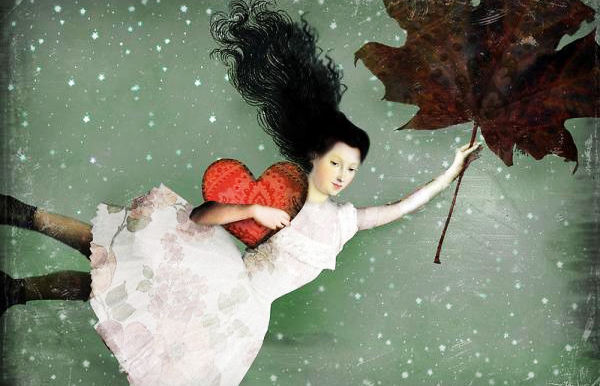melancholy
The Exquisite Pain of Unrequited Love

Painting by Wang Niandong
We have a habit of equating unrequited love with pain, but maybe it’s not that simple. There is also the drama of the rollercoaster ride, which can be thrilling in itself. Here’s a look at why we put ourselves through it:
She is the sun to him. He feels warmth radiating from her face. The shy blinks of her eyes are like rays of light, a glow emanating somehow from inside him and out. She heats him in the coldness of winter, a furnace in his chest, fuelled by her presence. And yet she herself is cold.
She must have been burned before, or burned too bright. Love doesn’t interest her now. She’d rather be alone. So when he asks her to join him for a drink or to watch a film, she makes up whatever excuse, chooses anything else instead. She’s always busy, supposedly. She gives sparingly, like a miser. He tries to take her to dinner, but her time is too precious to her — she has no time for him, can’t give him attention. She gives him lunch when he wants a weekend.
They do sometimes see each other. He steals minutes whenever he can, whenever she grants him the chance. She says she enjoys their time together — every so often. But after that, he must wait again. What is it about her? What is it about him? They talk and talk online each day, communicate often. But so rarely do they meet. Are there others? Surely. Perhaps every night is a different suitor, a different chance for her to shine. He waits for when she’s free again, waits patiently.
When they meet her touch is stiff, rigid. She’s restrained, tight. He likes to hug, to feel human touch, wants nothing more than his arms around her and for her arms around him. He wants so badly to feel it — some evidence of feeling. But she doesn’t give in. Her smile is vexing, her eyes full of mixed messages. He reads tenderness in bright moments — can actually feel it even — but it’s followed by its opposite. She’d prefer to shun familiar conventions, prefers instead her distance. And when he goes home alone, he feels the coldness.
She wants her interactions packaged in plastic, safely sanitized of emotion. Maybe it would feel too good. Or maybe it would hurt too much. Everyone can understand it. He doesn’t feel so different. Nothing ever works out, after all. Not really, anyhow. Everything ends, so why start? He knows it just as well. But this seems special to him, seems worth the chance.
So he takes whatever she gives. The crumbs of her interest. The cordial invite to a party where she doesn’t try to talk to him. He wanders aimlessly, hoping for any sort of connection, accepting it from her other friends who perhaps feel the same as him. They talk, his mind elsewhere, on her, one eye on her laugh, her posture, her conversations with others. He sneaks around, plots his position, manages an actual moment and makes plans with her.
She cancels them. Sometimes at the last minute, sometimes days in advance, sometimes with no warning whatsoever — just flaking. And yet he keeps at it, admits to himself that he cares, convinces himself that she’s somehow worth it. They make plans again, even as his friends warn him against it. ‘Why cause yourself pain? You do, of course, know it’s coming.’
He continues to pursue her, even after clear rejection, even as a friend. ‘Fine, a drink,’ she concedes, after so much insistence. They meet one night, between other plans she has. She squeezes him in. Weeks later — each day he’s counted now with impatience — they meet again. Finally for a full evening. And she enjoys it. Of course he does the same.
Her eyes beam. Her batted lashes acknowledge his gaze. She hides in plain sight, darts away. He still looks. The blush of her soft cheek, the faintness of her skin on her thin neck is all she offers him. To him it’s enough. He gets lost in it, just staring at the visible details, dreaming.
If she could, she’d cover up completely. She can feel his eyes, can’t quite handle them. She doesn’t want to be seen. Perhaps she can feel him looming, covering her with his stare like some sort of beast. He’s a creep.
But she plays with him, assuages his hard feelings. She gives him just enough to keep it all going. There is surely something mutual. A dance, perhaps, however grotesque.
She sees something in him, at least. And of course he sees in her everything. He sees her golden hair, how it wisps. He sees her shoulders, her waist, her hands and wrists. He sees her lips and imagines kissing them, sometimes darts toward them in sudden bursts of uncontrollable attraction. She turns her cheek and he lands on it. She smiles and he sees the sharp angles of her mouth, her perfect teeth, the strength of her total potential — mental and emotional and sexual. It’s contagious. Even in failure, repeated over and over, he smiles too from her spirit.
The night wears on. There’s nowhere he’d rather be. He drinks, loosens, wants to let go of all inhibitions, invest in the moment fully. She keeps her wits. She’s guarded. She tries his whiskey, somehow excited by it, but she remains reserved. She wants to wake up early tomorrow, prioritize other things, herself. She sips her cocktail as slowly as possible. She is on the defense and he is met over and over again by her impenetrable fortress of resistance. She reminds him that she just wants to be friends.
If she were Rupunzel, she’d get a haircut. If she were Sleeping Beauty, she’d never wake up, her face buried into the pillow. If she were Snow White, she’d be happy with the dwarves, a life of labor and without love. If she were Cinderella, she’d stay home with pleasure. She wants him to be Flounder to her Ariel, a singing candle in her empty mansion, not the beast to whom she could one day love. But to him she is Belle.
She goes home without much of a goodbye, runs off to her train, no touch, no kiss. He hangs his head, alternates between despair and optimism. He’s recharged by her presence, even if she keeps him at arm’s distance. In that distance he has plenty to imagine as he holds himself in bed, alone, her alone as well, somehow more resolute, more committed to it. It goes on like this.
It’s a game, perhaps. She knows how he feels because he doesn’t hide it, and she tells him no. Over and over, like Charlie Brown and the football, she gives him her attention and then pulls it away. Over and over, he keeps wanting to play. One day, he believes, things will change. They must. He believes in his own love.
But no. Despite their ongoing conversations, their messages on every platform, all their shared interests, when she says she doesn’t like him like that, she means it. She insists on fitting him into her roster of just-friends, in denial of the jealousy she fills rooms with. She’s particular about who embraces her. She’s choosy, of course. He likes that about her. Him and everyone else. The rejects: good enough for killing time and some decent conversations. That’s about it. She gets away with it. He turns up at her gatherings, sees the same faces. Fans of a turn-down artist.
One day she admits her interest in another man. It stings him. He tries to swallow it. And then he discovers her in full swoon, at one of her functions, in front of him and everyone, she flaunts it. She lets on that she’s capable of affection, that she is indeed a warm-blooded human. And that’s what hurts him most, to know that the coldness is indeed doled out on each individual basis. It is personal, her absence of love for him. Like a lump in the throat or a punch in the stomach. Unrequited love is the pain you give yourself.
—
Keith Telfeyan is a storyteller and editor of words & pictures. Local in California, New York & Berlin. Likes: art house cinema, whiskey, staring out windows. Dislikes: early mornings, disorder, time passing too quickly.
Be the first to write a comment.
Your feedback
